
THE TIDES OF SEPTEMBER
RENATO REDENTOR CONSTANTINO
Business Mirror
September 18, 2006
They say love and lives rise and fall like the ocean. That, in the end, there is no end, only ebb and flooding and ebb.
It is comforting to think that we are fluid and not candles, which run out when the wick is consumed. Maybe it's not really all so bad.
Not too long ago, others had asked the same questions that may be driving not a few today to grief.
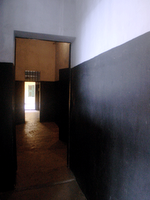 "What is it about this society and these times," asked the journalist and poet Jose F. Lacaba in 1970 as he surveyed a large, gathering throng. What is it "that has driven the best minds of my generation to dissipation and despair, or taken them down the road of revolution?"
"What is it about this society and these times," asked the journalist and poet Jose F. Lacaba in 1970 as he surveyed a large, gathering throng. What is it "that has driven the best minds of my generation to dissipation and despair, or taken them down the road of revolution?" A crowd that had gathered in Plaza Miranda on June 12, 1970 had become restive, but it was a different, deep-rooted kind of restlessness, and the restiveness elbowed its way through Lacaba's thoughts and notepad. For assembled in the square were young people, who no longer believed what power had taught them and who, as another, much later and far different Marcos prefixed with the title "Subcommandante" had written, appeared to have skipped class when conformity and idiocy was being taught.
"Anyone who bothered to listen intently would have felt ... a shudder in the heart, a thickening of the blood," wrote Lacaba of the angry multitude, pledging open subversion and an armed response to the increasingly fascistic government. Angry youths "with long memories" who "were remembering them all."
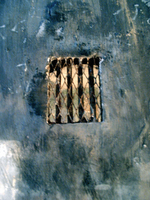 "How many of those young men and women reciting that pledge in the driving rain would really take it to heart and take to the hills?" Lacaba wondered. "There were a hundred, two hundred, perhaps more, on Plaza Miranda that night, intense young men and women, their faces bright with a fearful exaltation.... How many of them meant what they said when they loudly proclaimed their belief in a politics of the armalite.... How many of them would really lay their courage on the line and go beyond the point of no return?"
"How many of those young men and women reciting that pledge in the driving rain would really take it to heart and take to the hills?" Lacaba wondered. "There were a hundred, two hundred, perhaps more, on Plaza Miranda that night, intense young men and women, their faces bright with a fearful exaltation.... How many of them meant what they said when they loudly proclaimed their belief in a politics of the armalite.... How many of them would really lay their courage on the line and go beyond the point of no return?" The line was drawn and on the other side was an increasingly menacing leadership barren in vision and infected with epiphanies.
"In the driving rain, in the dark night of the soul," wrote Lacaba, "I shivered and was afraid for all the young men and women who were on Plaza Miranda that night."
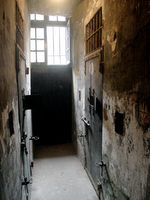 Two years later and for fourteen years, a torrent of cadavers -- literally, said Rene Saguisag, who has a bonfire in his chest, the best and the brightest of a generation.
Two years later and for fourteen years, a torrent of cadavers -- literally, said Rene Saguisag, who has a bonfire in his chest, the best and the brightest of a generation.Yet too few today remember. Like water, it seems that time can be a greedy thing, a deluge intent on bleeding the soil of its nutrients. "Sometimes it steals all the details for itself," said Khaled Hosseini, author of the novel The Kite Runner.
But water always leaves its mark; there is salt and there is the skin of tides left on riverbanks.
Nilo Valerio disappeared in 1985; his disappearance is an open wound that forbids us to forget. In 2003, his wife and two sons visited the village where Nilo was killed. Elderly people in the village saw the resemblance of the children to their martyred father whose face they could still recall "and came up to the sons for a tearful reunion."
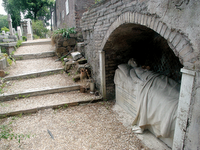 Lorena Barros was a child of her family and a daughter of her people -- a single tree, as WH Auden wrote, shooting out from fallow ground and leaning out far over a cliff, contemptuous of the precipice. Decades ago, fighting the dictatorship from the guerilla zone, Laurie wrote a letter to a friend about "learning all over again what love means." "Nasisilaw ako," she wrote, blinded by the eyes of the person whom she had come to embrace. "Di na ako nadala," wrote Laurie, ending her letter probably with the flourish of a secret smile -- "I have not learned to keep from getting burned again." On the morning of March 24, 1976 the martial flood of the Marcos regime engulfed her body.
Lorena Barros was a child of her family and a daughter of her people -- a single tree, as WH Auden wrote, shooting out from fallow ground and leaning out far over a cliff, contemptuous of the precipice. Decades ago, fighting the dictatorship from the guerilla zone, Laurie wrote a letter to a friend about "learning all over again what love means." "Nasisilaw ako," she wrote, blinded by the eyes of the person whom she had come to embrace. "Di na ako nadala," wrote Laurie, ending her letter probably with the flourish of a secret smile -- "I have not learned to keep from getting burned again." On the morning of March 24, 1976 the martial flood of the Marcos regime engulfed her body. 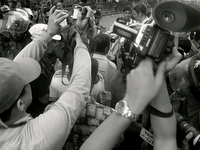 The terror would go on for one more endless decade, until an invisible breaking point is reached and the people who had lost their country finally resolve to together reclaim it.
The terror would go on for one more endless decade, until an invisible breaking point is reached and the people who had lost their country finally resolve to together reclaim it.Then short of twenty years, they jettison the memory and the waters recede. Or so they think.
 Within the three decades after martial law was declared in the Philippines on September 21, 1972 slaughter returns with torrential force, singling out old foes -- the critic, the cleric, the activist and the journalist.
Within the three decades after martial law was declared in the Philippines on September 21, 1972 slaughter returns with torrential force, singling out old foes -- the critic, the cleric, the activist and the journalist.Hundreds drown and families go under. Lives disappear and whole villages are swept away by a familiar flood spawned by a government completely beholden to a military that remains incapable of distinguishing between innocents and those guilty of loving their country.
I hope there will be no disappearances in my time," said Gloria Macapagal Arroyo to families of victims of human rights atrocities months after she grabbed power in 2001. Hope floats, like corpses.
Like feces. #
NOTES:
1. Dispatch of Jose F. Lacaba, "The rain and rhetoric of revolution," Philippine Free Press, 20 June 1970. From Jose F. Lacaba, Days of Disquiet, Nights of Rage (Salinlahi Publishing House, Manila: 1982).
2. Rebecca Solnit, "Acts of Hope: Challenging Empire on the World Stage," OrionOnline.org, 20 May 2003. See: http://www.orionsociety.org/pages/oo/sidebars/Patriotism/index_Solnit.html
3. Ibid. 1.
4. Ibid.
5. The phrase "infected with epiphanies" is originally from the poet Conchitina Cruz' piece "The Last Page" which can be found in the poetry journal High Chair, Issue Number 5, July-December 2005. The phrase belongs to a haunting passage: "Who can blame the mother who bargains for the daughter she had on page one, the woman prior to the heroine and her grotesque body, infected by epiphanies? Weeks later, we find ways to pass time... " See the poet's whole poem at http://www.highchair.com.ph/lastpage_cruz.htm
6. Ibid. 1.
7. Michael Tan, "Present!" Philippine Daily Inquirer, 30 August, 2006.
8. From the short poem by WH Auden,"Leaning out over / The dreadful precipice, / One contemptuous tree." See: http://www.sat.dundee.ac.uk/~arb/speleo/auden.html
9. A letter to Victoria (an alias), reproduced in note 88 of "Maria Lorena Barros -- Gentle Warrior," Maita Gomez from Six Young Filipino Martyrs, ed. Asuncion David Maramba (Anvil Publishing, Inc.: 1987)
10. Ibid 7.
All photos by Red. Please email if you wish to use the pics. (1) A river in Vietnam that passes through a dark, damp cave. (2) A door from the 'Hanoi Hilton' prison, Hanoi, Vietnam. (3) A lobby at the Hanoi Hilton. (4) A foreboding corridor from the Hanoi Hilton, a prison with brutal memories. Its management has passed several hands -- first, the French, who built it, then American, and then Vietnamese. The prison's 'clientele' more or less went through similar changes but they were mostly Vietnamese and then Americans. (5) A sad, haunting grave with a sculpture of a woman in repose holding a rose from the beautiful and thoroughly moving English Cemetery, also known as the Keats Cemetery, in Rome. (6) A phalanx of photojournalists surrounding a police line during the 20th anniversary of EDSA, the same day the Arroyo administration attempted to outlaw people power. (7) A photo in negative of a dark, freezing passage through a hill in Belgium during the author's search for the Rochefort trappiste brewery in St. Remy.
READ THE VEIN OF THIRTY-FOUR YEARS
BACK TO RED's MAIN PAGE
READ MORE ESSAYS BY RED
A LITTLE PERSONAL STUFF
3 comments:
Perhaps it is not only forgetting that is to blame.
Denial is the disease, forgetting is the symptom.
Anna
That is true. The troubling thing is that many also think that the disease you mention is the cure to the symptom you cite. Hirap.
Luna asked before why only kuya knows this 'Bituin' kasi daw sya moon and she knows bituin is star; dapat sila daw ang friends.
Ay, kailangang magtagpo ang buwan at ang bituin. :)
Bituin has also been asking about Luna and Rio. She wants to see them again!
Post a Comment